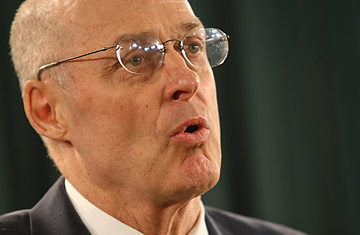
Treasury Secretary Hank Paulson
The dominoes fell one right after another: the demise of Lehman Brothers tipping into the rushed sale of Merrill Lynch to Bank of America, followed by the federal takeover of AIG. Then, the desperate credit crunch of Wednesday caused the emergency maneuvering by the Federal Reserve and the Treasury on Thursday and Friday.
In a week, the financial crisis of 2008 changed everything — and now comes the cleanup: if the Administration's $700 billion Wall Street bailout plan is approved by Congress, the United States will see changes to its political economy that were unimaginable a week ago.
Among them:
A massive transfer of power to the Treasury Department.
Secretary Henry Paulson is requesting unprecedented powers to resolve and dispose of billions of dollars of mortgages and mortgage-backed securities that would turn the Feds into the liquidator of last resort for business deals gone bad. Those powers, should Congress grant them, would come on top of authority Paulson was quietly granted earlier this summer to resolve the Fannie Mae and Freddie Mac messes. And the federal fire sale may not be limited to problem portfolios at home; there are reports that some of those entities subject to Treasury's purchase-and-resale powers may be foreign.
A sudden shift in taxpayers' financial priorities.
To put the bailout plan in some kind of perspective: Paulson would rule over a pile of assets that exceeds the annual Pentagon budget of $507 billion by nearly 50%. For at least the next year, and perhaps for years after, Treasury's spending authority will make it harder for the next President to fulfill campaign promises and pump money into new priorities. Depending on how Paulson's power is structured, it could even postpone new federal spending on health-care reform or infrastructure improvements, or hasten the need for increased taxes and deep spending cuts. A similar challenge faced incoming President George H.W. Bush in 1989 when his Administration had to oversee a $100 billion cleanup of poorly regulated savings and loans that were weakened or simply crashed after the go-go 1980s.
An abrupt refocusing of the presidential race.
Once again it's about the economy, stupid — and financial markets and how they are best regulated. There will also be discussion of whether anyone on Wall Street will be forced to pay a price for the wreckage taxpayers are now being told they will have to clean up. That shift should benefit Democratic nominee Barack Obama for many reasons, as economics in difficult times rarely help Republicans. But this race has proved conventional wisdom wrong time and again. What seems more certain is this: though virtually no one was calling for it, a new era of big government has arrived.
A dismaying final chapter for George W. Bush.
Conservatives who hoped the Bush team would leave a legacy of smaller government, freer markets and fewer regulations can officially kiss that hope goodbye. Government officials report that the President, whatever his ideological reservations about the Treasury's next move, cleared the way for the bailout in the face of what looked like certain economic meltdown.
Congress must still approve the bailout — but no one wants to take responsibility for what may come in the absence of action; the plan is likely to go through.
Of course, these changes are just for starters. There is no telling what this week may bring.
(For ongoing coverage of the financial crisis aftermath, go to TIME.com's Curious Capitalist blog.)
